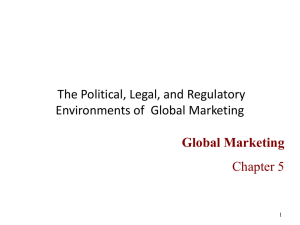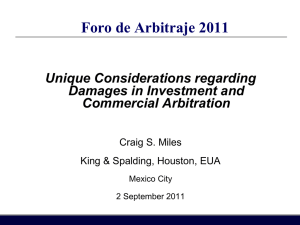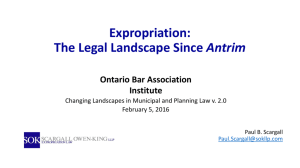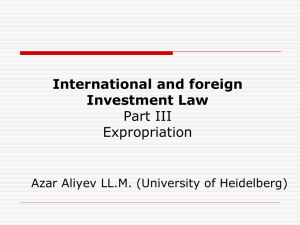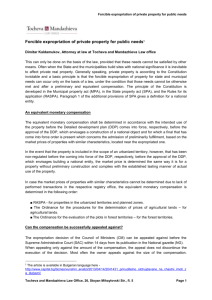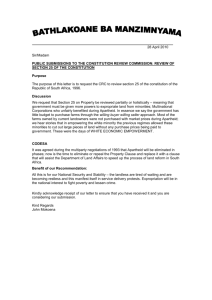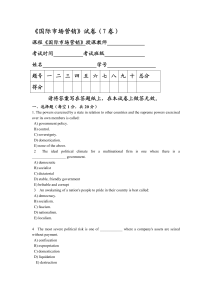Powers of the Minister of Public Works
advertisement
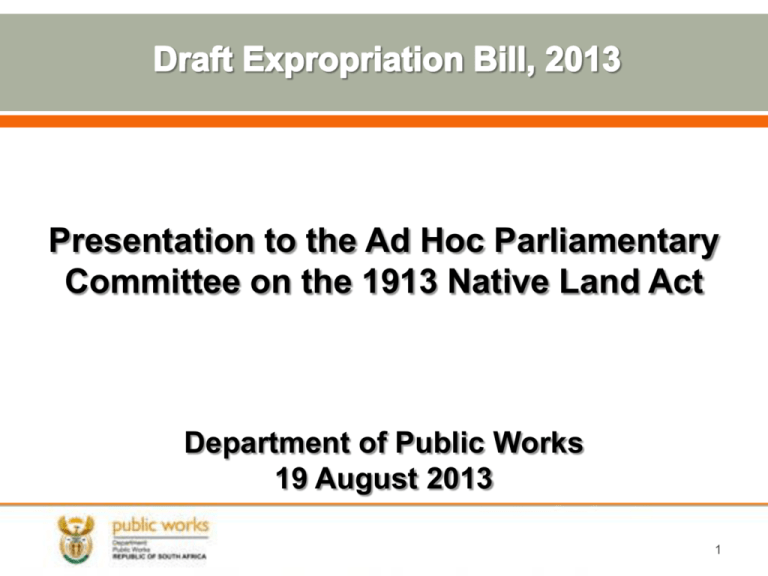
Presentation to the Ad Hoc Parliamentary Committee on the 1913 Native Land Act Department of Public Works 19 August 2013 1 A. Introduction B. Reasons for review of Expropriation Act, 1975 C. Draft Expropriation Bill, 2013 Application of the Legislation Powers of the Minister of Public Works Process of Expropriation D. Conclusion 2013-08-19 2 1. Expropriation is recognized as an essential mechanism for the State to acquire property in certain instances (such as essential infrastructure, land reform and conservation) and is thus protected by the Constitution, 1996. 2. The general framework for expropriation is outlined in Section 25 of the Constitution which provides that property may be expropriated only in terms of law of general application, and that no law may permit arbitrary deprivation of property. The Constitution further determines that – expropriation may only occur for a public purpose or in the public interest and subject to payment of compensation; and “public interest” includes the nation’s commitment to land reform, reforms to bring about equitable access to all South Africa’s natural resources and other reforms to redress the results of past racial discriminatory laws or practices. 2013-08-19 3 3. Predating the Constitution within the expropriation regulatory framework is the Expropriation Act, 1975. The Expropriation Act (a) confers the power to expropriate property for public purposes on the Minister of Public Works; and (b) generally sets out procedures to be followed by an expropriating authority when carrying out an expropriation. 4. The review of the Act became necessary to ensure consistency with the spirit and provisions of the Constitution, in particular – the equality clause (section 9); the property clause (section 25); just administrative action (section 33); as well as extension of the purpose for expropriation to include public interest. 2013-08-19 4 4.1 The Expropriation Act limits the payment of compensation to – (a) owners; (b) holders of registered rights; and (c) holders of only certain unregistered rights in expropriated property. 4.2 Section 25 of the Constitution, however, permits the expropriation of property, subject to the payment of just and equitable compensation to all persons affected by an expropriation. The Constitution therefore extends its protection to both holders of registered and unregistered rights in property. A holder of a right in property, whether registered or unregistered, is constitutionally entitled to compensation when property is expropriated. 2013-08-19 5 4.3 Compensation in terms of the Expropriation Act, 1975 is determined primarily on the basis of the market value of the expropriated property. 4.4 The Constitution [section 25(3)] however, requires that just and equitable compensation be paid and that such compensation be determined by having regard to all relevant circumstances, without placing undue weight to any single or particular factor – “The amount of the compensation and the time and manner of payment must be just and equitable, reflecting an equitable balance between the public interest and the interest of those affected, having regard to all relevant circumstances, including(a) the current use of the property; (b) the history of the acquisition and use of the property; (c) the market value of the property; (d) the extent of direct state investment and subsidy in the acquisition and beneficial capital improvement of the property; and (e) the purpose of the expropriation.” 2013-08-19 6 4.5 The Expropriation Act, 1975 does not embody the Constitutional principles of just administrative action, such as providing for notification through publication of an intended expropriation, incorporating the purpose and rationale for such expropriation; providing for notification to all known affected persons of an intended expropriation, incorporating the purpose and rationale for such expropriation; affording interested parties an opportunity to raise objections and make representations to the Expropriating Authority before a decision to expropriate is taken; and requiring the Expropriating Authority to consider all submissions from interested parties, before deciding whether or not to proceed with an expropriation. 2013-08-19 7 4.6 There is an array of authorities within all spheres of government that are empowered to expropriate property, through various pieces of legislation: National Government: President and 12 Ministers are empowered; Provincial Governments; Premiers and certain MECs are empowered; Local Government: All Municipal Councils are so empowered. This array of legislation empowering expropriation prescribe varying procedures in the exercise of the power to expropriate. There is therefore a need to provide certainty and give guidance to those involved in an expropriation, both for the State, as well as any person affected by an expropriation, by prescribing uniform expropriation procedures to be followed by all expropriating authorities, when exercising powers of expropriation. 2013-08-19 8 4.7 The Minister of Rural Development & Land Reform is empowered to expropriate land or rights in land in order to execute land reform – Restitution: Restitution of Land Rights Act, 1994; Redistribution: Provision of Land and Assistance Act, 1993; and Tenure reform: Extension of Security of Tenure Act, 1997. 4.8 The Minister of Agriculture, Forestry & Fisheries is empowered to expropriate land in terms of the – Conservation of Agricultural Resources Act, 1983; and National Forests Act, 1998. 4.9 Similarly, the Minister of Arts & Culture is empowered to expropriate property in terms of the National Heritage Resources Act, 1999. 2013-08-19 9 5. In March 2013, Cabinet approved that the draft Expropriation Bill be published for public comment. The Department received extensive submissions from organised agriculture; commerce and industry; the financial sector; the legal fraternity; the property industry; professional associations; public entities; government departments and members of the public. In the main, the comments were positive, offering wideranging proposals towards improving the draft legislation. 6. The draft Expropriation Bill is currently under discussion at NEDLAC and the Department remains on track to submit the Bill to Parliament end of September / beginning of October 2013. 2013-08-19 10 The following overview of the draft Expropriation Bill will focus on – Application of the draft legislation Powers of the Minister of Public Works Process of expropriation 2013-08-19 11 7. Application of the draft legislation The procedures in the draft Bill will apply to all expropriating authorities in all spheres of government. The existing powers of expropriating authorities, as granted in terms of their empowering legislation, are to remain intact, subject to the exercise of such power in accordance with the uniform procedures proposed in the draft Bill. 8. Powers of the Minister of Public Works Power to expropriate property for a public purpose or in the public interest in the execution of his/her mandate. Power to expropriate property on behalf of an organ of state. 2013-08-19 12 9. The expropriation process includes – Investigation and gathering of information for purposes of expropriation Notice of intention to expropriation Notice of expropriation Verification of claims for compensation made after the date of expropriation Determination of compensation Process in negotiating compensation 2013-08-19 13 9.1 Investigation The Draft Bill provides a pre-expropriation process. An expropriating authority must investigate, inter alia, suitability of the property for the purposes for which it is required; impact of the expropriation on existing and future engineering services, infrastructure and housing and town planning; and existence of registered/unregistered rights in the property. An expropriating authority must, inter alia, call upon the Departments of Mineral Resources and Rural Development & Land Reform, as well as the relevant Municipality to provide requisite information. 2013-08-19 14 9.2 Notice of Intention to Expropriate A notice of intention to expropriate must be – published, informing the public of such intention; delivered to DRDLR and relevant Municipality; and served on all known affected persons, inviting them to lodge any objections or submissions. The prescribed process includes the following steps prior to making a decision to expropriate – notification of an intention to expropriate (“administrative decision”), Invitation to comments or submission, consideration of or consultation on such comments or submission, decision on whether to expropriate the property or not, and Notification of the decision 2013-08-19 15 9.3 Notice of expropriation If an expropriating authority, after due consideration of all information and submissions received, decides to proceed with the expropriation, he/she must (inter alia) Serve a notice of expropriation on the – owner and holder of a registered right in the property; and known holders of unregistered rights in the property; Publish the notice of expropriation to inform the public; and Deliver a copy of the notice to the – Director-General: Rural Development & Land Reform; Municipal Manager; Registrar of Deeds // Mineral & Petroleum Titles Registration Office; and Holder of a mortgage bond registered against that property. 2013-08-19 16 The Notice of Expropriation must include – purpose of the expropriation; reason for the expropriation of that particular property; date of expropriation and date of possession of the property; amount offered as compensation (including compensation offered to known holders of unregistered rights in the property); an explanation of what the amount of compensation comprises; and copies of reports detailing how the amount of compensation was determined. 2013-08-19 17 9.4 Verification of unregistered rights and consequences of expropriation on unregistered rights All unregistered rights are simultaneously expropriated, unless stipulated. The draft Bill provides a process for the verification of claims by persons to have held unregistered rights in an expropriated property prior to date of expropriation and for which they have not been compensated. The process includes the following steps – Request for evidence to substantiate claim; receipt and forwarding of evidence to DRDLR; making a determination on the claim; Notification of the determination; If the claim is valid, negotiation on and payment of compensation 2013-08-19 18 9.5. Determination of Compensation The draft Bill provides for the payment of just and equitable compensation, [as stated in Section 25(3) of the Constitution] which is to be determined by taking into consideration all relevant factors including (but not limited to) – The current use of the property; The history of the acquisition and use of the property; The market value of the property; The extent of direct state investment and subsidy in the acquisition and beneficial capital improvement of the property; and The purpose of the expropriation 2013-08-19 19 9.6. Process in negotiating compensation The Notice of Expropriation must include an offer of compensation. Expropriated owners and holders of rights must indicate, in writing, whether the compensation offered is accepted. If not accepted, the expropriated owners and holders of rights must indicate the compensation claimed and provide full particulars of such claim (including valuations or other professional reports informing the claim). If the expropriating authority does not accept the claim by the owner or holder of rights, he/she must make a revised offer; indicating the details thereof. A claim for compensation and an offer of compensation remain in force until the – expropriating authority makes a revised offer; claim or offer has been accepted; or compensation has been decided or approved by a court. 2013-08-19 20 10. Conclusion The Department remains focused on submitting constitutional and practical legislation to Parliament that would guide the actions of organs of state, property owners and holders of rights in property in dealing effectively with the sensitive issue of expropriation. ~Thank you~ 2013-08-19 21


